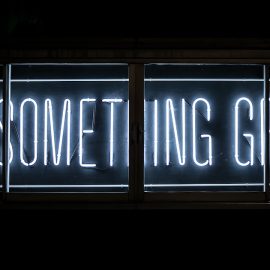

This article is an excerpt from the Shortform book guide to "The Light We Carry" by Michelle Obama. Shortform has the world's best summaries and analyses of books you should be reading.
Like this article? Sign up for a free trial here.
What does it take to change your life? Why do people get stuck in their old patterns and struggle to change against their best interests?
Change doesn’t happen overnight. People who think that they can overhaul their life quickly are so focused on hitting the next milestone that they fail to recognize smaller, slower progression. As a result, they feel discouraged even when making progress.
Here’s why change is a journey, according to Michelle Obama.
Michelle Obama: Change Is a Slow Process
Many people believe change happens quickly and all at once, only requiring an initial burst of effort to set in motion—much like sledding down a hill only requires a quick push before gravity takes over. However, change is a slow process involving gradual progress, making hard decisions, and compromising. In other words, real change isn’t as easy as sledding down a hill—it’s more like training to be a downhill skier, putting in years of hard work and practice before finally being able to safely and swiftly reach the bottom of the hill.
In her book The Light We Carry, Michelle Obama describes her own experiences with misunderstanding change as occurring in times of great stress, such as the Covid-19 pandemic. These experiences led her to create the strategies for understanding change and nurturing personhood we’ll discuss in this section.
| Why People Misunderstand Change We might misunderstand change because our brains simplify complex situations to make them easier to understand, according to The Art of Thinking Clearly by Rolf Dobelli. Instead of recognizing a complex web of causes that create an end result, we tend to simply credit one cause. Thus, we may look at a significant change and credit it solely to some recent action. We then believe that said change happened quickly, when in reality, change is a journey and the result of years of effort. For example, we might look at the Civil Rights Act of 1964—which banned discrimination in employment and public accommodations—and credit it solely to Martin Luther King Jr.’s speech “I Have A Dream,” which he gave the year before. In reality, this legislation was the result of years of protests and demonstrations. While King’s speech was important and widely publicized, his speech likely wouldn’t have caused such change if it weren’t for the previous, less publicized efforts. To overcome this misunderstanding of change, focus on seeing the whole web of influences on an event or situation. Consider all possible causes for the situation and how you could interact with those causes to improve the situation. This requires a lot of logical thinking, which may explain why Obama struggled with misunderstanding change when stressed: Logical thinking occurs in the prefrontal cortex, a part of the brain that helps with processing the stress produced by the amygdala, the emotional part of the brain. Obama may have struggled to think rationally because Covid-related stress made it difficult for her prefrontal cortex to quiet the fears raised by her amygdala. |
Misunderstanding Change Makes People Feel Unsuccessful
People who believe that change happens quickly tend to focus solely on whether they’ve met their overarching goals and are less likely to recognize smaller, slower progression. This means they feel unsuccessful even when making good progress, just because they haven’t completely fulfilled their aspirations quickly. In addition, they don’t realize how much time and energy reaching their larger goals requires, so they don’t set reasonable sub-goals or pace their efforts. This means they quickly lose energy, exacerbating their feelings of incompetence.
For instance, let’s say Caleb’s goal is to become a famous singer. He believes posting videos online of his singing will help him get a record deal quickly. In the next months, Caleb builds a respectable online following. He doesn’t see this as success, though, because he’s focused solely on getting a record deal. Instead of feeling happy with his progress, he feels discouraged and like he’s not good enough to meet his goals. Eventually, these feelings make him quit.
(Shortform note: Obama says people who fixate on quickly meeting their overarching goals are less likely to feel successful because they don’t recognize smaller progressions. In The 10X Rule, Grant Cardone rejects the idea that recognizing smaller progression is important. He says you must set extreme goals to feel successful because motivation is tied to how ambitious your goals are. Setting extreme goals results in extreme motivation, which lets people take “massive action” and succeed in ways they couldn’t if they focused on smaller progressions. Cardone says people who feel unsuccessful haven’t set high enough goals, and would likely tell Caleb to increase his motivation by focusing on winning a Grammy rather than getting a record deal.)
Feeling unsuccessful can cause mental health issues, Obama says. If you don’t feel successful in your efforts to create change, you won’t feel satisfied or confident. You’ll doubt your abilities and efforts, which can lead to feelings of hopelessness and depression.
(Shortform note: Feeling unsuccessful may cause mental health issues by specifically reducing dopamine production. Dopamine provides motivation and is part of the pleasure system. Scientists believe this hormone helps you remember times you’ve felt pleasure before and alerts you when you’re in similar situations, encouraging you to repeat that experience and earn more pleasure. When you meet a goal, dopamine connects “meeting goals” to the pleasure of success, increasing motivation. If you don’t succeed, that connection weakens. Over time, your brain stops producing dopamine when you try to meet your goals, leaving you unmotivated and unhappy.)
Embrace Gradual Progress
To nurture your personhood and avoid misunderstanding change, embrace gradual progress, Obama says. By doing so, you can recognize the steps you’ve made toward your goals, increasing feelings of success. In addition, understanding how much you’ve advanced helps you determine how to succeed further. (Shortform note: In The 12 Week Year, Brian Moran agrees that embracing gradual progress and assessing how far you’ve advanced toward your goals is important. He suggests doing so by reviewing your progress every week. Regular reviews help you recognize any problems that may stop you from reaching your goals and give you the chance to adjust your strategy going forward.)
Embrace gradual progress by setting small, manageable goals. Obama stresses that these tasks should be easy to fulfill so you’re almost guaranteed to succeed in meeting them and thus feel a sense of satisfaction and confidence. These goals can be as small as making your bed or attending a town meeting. Over time, these small steps compound to create large change. (Shortform note: Setting small goals strengthens your brain’s connection between meeting goals and pleasure, as discussed previously. The stronger this connection, the more motivation you’ll feel, which makes it easier to graduate to larger goals.)
Continuing our example, let’s say Caleb sets the manageable goal of gaining five followers every week for one month, then 10 followers a week the next month, and so on. Meeting these goals makes him feel successful and confident, which encourages him to make more videos. In turn, making more videos helps him gain followers faster. After building up a large following, he starts playing live shows and reaching out to record companies. With the confidence and success from completing his smaller goals, Caleb reaches his larger goal and signs a record deal.

———End of Preview———
Like what you just read? Read the rest of the world's best book summary and analysis of Michelle Obama's "The Light We Carry" at Shortform.
Here's what you'll find in our full The Light We Carry summary:
- Michelle Obama's advice on fulfilling your potential in life
- The benefits of nurturing and sharing your unique abilities and strengths
- How to overcome the obstacles to reaching your potential and creating change






